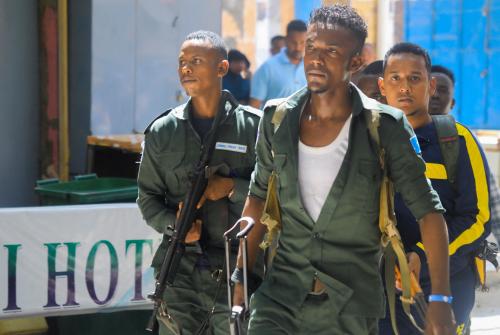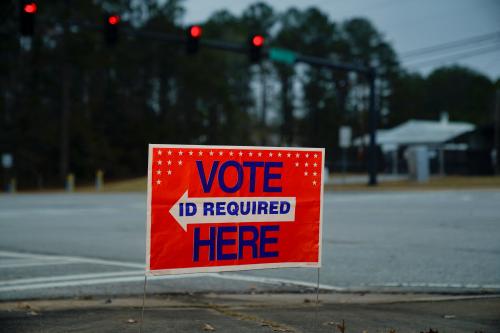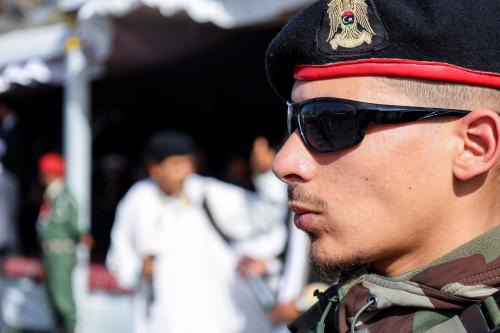The most important part of U.S. President Barack Obama’s recent speech about Iraq and Syria wasn’t how many air strikes the United States will conduct and when — the elements that have dominated much of the analysis of the event. Rather, it was his call to form, from scratch, an Iraqi National Guard.
That plan is a bold one, and it follows on what has been a good summer for Obama when it comes to Iraq policy. He has gotten two crucial things right. First, by working with local allies such as the Kurdish peshmerga forces, Obama was able to use limited U.S. airpower to prevent further conquests by the Islamic State of Iraq and al-Sham (ISIS, also known as the Islamic State). Second, by holding off from providing any more extensive help, he was able to push Iraqis to replace Nouri al-Maliki, the divisive incumbent prime minister, with a new one, Haider al-Abadi, and create a national unity government.
Obama didn’t make the latter decision simply because Americans like inclusive, democratic governance. It was because Maliki’s sectarian rule had so divided the country that the Iraqi army nearly dissolved when ISIS forces emerged on the battlefield this past spring. If the army was to be reconstituted so that it could reclaim the Sunni Arab heartland, including cities from Ramadi and Fallujah to Tikrit and Mosul, it needed a leader and a government it could believe in, obey, and die for.
A new government in Baghdad, in other words, was a prerequisite to success, not success in and of itself. And now comes the hard part: reestablishing meaningful Sunni Arab support for a security sector that lost a third or so of its units this spring (and a good many of its leaders before then, since Maliki had purged officers who were not part of his inner circle). In some sense, Sunni support started waning a few years ago, when Maliki failed to uphold promises he had made to the Sons of Iraq, the local militias that worked with U.S. and Iraqi forces in 2007–8 to defend their communities and helped make the surge a success. He never helped them find permanent postings, and his subsequent shenanigans during the 2010 elections and his pogroms against top Sunni political leaders thereafter only worsened things. In a broader sense, though, the problem goes back to the oppressive days of Baathist rule, when Sunni leaders including Saddam Hussein treated Shia citizens as second-class, sowing the seeds of later backlash.
And that is why one rearrangement of the deck chairs on Baghdad’s ship of state, however welcome, is not enough. Abadi’s new government is a welcome change, but it will almost surely not be enough by itself. Iraq is a broken society, not least across Sunni-Shia lines. And it is unlikely that Abadi alone will win enough Sunni loyalty to put things back as they were during the momentarily happy days of the surge and immediate post-surge period. Nor will he be able to ask Shia-dominated Iraqi army units to take back the Sunni Arab heartland — which they probably cannot, and perhaps would not — be willing to attempt.
This is where the concept of the National Guard comes in. The National Guard would be modeled on the Sons of Iraq program. It would have to be more formal, though, since it would be responsible for the lion’s share of the fighting and its members would thus need assurances that they would not be shunted aside by Baghdad the way the Sons of Iraq ultimately were. Baghdad would also have to equip and compensate its soldiers; the capital city has the revenue that the Sunni regions of Iraq do not. Otherwise, the government’s role with respect to the National Guard would be limited. Further, since the National Guard would be locally recruited, organized, trained, and deployed, its ranks should be cohesive, and its soldiers’ knowledge of their home communities should aid in intelligence gathering. Thus, the force will be more adept than national troops at identifying, isolating, and attacking ISIS cells.
The logic of all of the above is solid, which is why Obama favors the idea, as does Abadi. With his back against the wall — and a quarter of his country under hostile rule — the new Iraqi prime minister is being realistic about the need for a new approach.
There is only one problem, though. The Iraqi National Guard does not yet exist. Even if many able officers and soldiers are available to join it, it will take some time to determine the characteristics of the force and then create it, meaning that operations to retake the Sunni Arab heartland from ISIS would probably have to wait until 2015.
Nor is it just a matter of putting up recruiting banners and holding an open house. The Iraqi government, with guidance from Washington as appropriate, would have to decide how large the National Guard units should be so that they are capable of defeating ISIS but not trammeling Baghdad. In all likelihood, the units will have to include brigade-size formations — units of two-to-three thousand soldiers — to hit the sweet spot of size and scale.
Another question is how well armed these units should be. They will need some serious firepower, but their armor would have to be limited so that they could not easily mount a coup — a worry that the Shia community is guaranteed to have as such units are created and deployed within 50 miles of the capital. They need enough weaponry to defeat ISIS and, if necessary, to defend their homeland from even better-armed forces, but not enough mobility or armor to be able to defend themselves against the bulk of the Iraqi army in the nation’s capital.
Finally, there is the issue of American support. Taking back major cities will require real plans at the tactical and the broader operational level; being able to fight effectively in small units won’t be good enough. To help this process along, the United States needs to retain the option of sending mentoring teams out into the field with these new units. That is something Obama won’t like — it is a role that involves some risk to U.S. personnel. Even so, it would be a far cry from the large number of troops the United States had deployed in Iraq before.
Iraq may turn out to be the simpler of the two fronts on which to fight ISIS. But that doesn’t mean it will be easy. In addition to increasing its commitment to Iraq, the United States will also need to increase its patience and, quite probably, its boots on the ground.
This opinion originally appeared on foreignaffairs.com.



Commentary
Op-edBeyond Air Strikes in Iraq
September 12, 2014